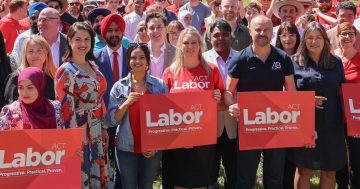
Do nearly two decades of Labor incumbency mean that the ACT is now effectively a one-party state? File photo.
In many ways, the ACT is a blessed and comfortable community. We are the best educated, longest-lived citizens in the country with the highest median incomes. Politically, we’ve nailed our colours to the mast: there’s always been a Liberal vote, but this is emphatically a Labor town at every level. We’re on the cusp of two decades of Labor government at next year’s local elections.
So as years of incumbency creep on, has the ACT effectively turned into a one-party state? And if so, what are the consequences for politicians, ordinary Canberra voters and our participatory democracy?
In recent months I’ve had private conversations with several senior figures across the political spectrum. In measured, thoughtful analyses, they agree that the unchanging Labor government is not good for our political wellbeing.
On the Labor side, the argument is that the party is too busy with the everyday work of government to pause and reflect on their direction, to ask searching questions about whether they’re on the right track. There’s less opportunity to cut out the dead wood in the representative ranks or behind the scenes. The well-oiled machine rolls along. Networks become entrenched.
Of course, there are people within the current administration putting hard work into the ideas they’re developing. But wouldn’t it benefit everyone in government to have the time and space to have a good hard look at themselves and ask the tough questions about whether they’re on the right track? And while the Greens promote their separate policy initiatives, they are, fundamentally, part of the government mechanism and therefore the power structures.
For the Liberals, the problems are different but no less significant. There’s the same risk of laziness: nothing’s likely to change at the next election, so why put much effort into developing a thorough-going set of policies for an alternative government, a genuinely different vision? Much easier to simply oppose the current government about anything meaningful.
Long-running Labor incumbency means it’s been easy to get comfortable in Opposition without making decisions for which voters will praise or blame you. The arguments become internal, about who wins the party room rather than who wins the election. I’ve been told that there are those within the ACT Liberals for whom ideological purity matters more than victory. Surely that’s a perilous state of mind for any opposition?
A further consequence is that the political talent pool can be increasingly shallow once you get past the principal operatives. In a jurisdiction where it’s always “business as usual”, exceptional outside candidates have less incentive to nominate and party processes dominate pre-selections. That, in turn, can mean a dearth of inspiring politicians to fire the electorate’s imagination.
Business has problems too. Entrenched relationships with the same government, year after year, as a client or a grant provider have a stifling effect on the commercial community’s voice and influence. It’s understandable that business people don’t want to endanger those relationships, but nor do they have much alternative when there’s little chance of a new government on the horizon.
Problems flow through into planning and consultation too. With just one layer of government in the Territory, there’s little capacity to argue out decisions beyond an ACAT challenge or find a different avenue for change. The government has been making efforts to remedy its consultation issues, but in general, they’re only obliged to carry out the process, not implement the results.
Surely, then, the answer is to vote in strong independents in both the Legislative Assembly and in the Federal Parliament? Not so much: as the recent Federal election shows, it’s very very hard to take a seat, even for well resourced third parties like the Greens, much less an independent like Anthony Pesec. Next year’s ACT election is likely to deliver similar results to the last one.
Is there an obvious solution? Labor won’t easily give up local government and the Opposition doesn’t show much sign of mounting a strong challenge. In the end, it’s up to the voters of Canberra. If we’re all not willing to shake up the system, then it will indeed continue to be business as usual.





















